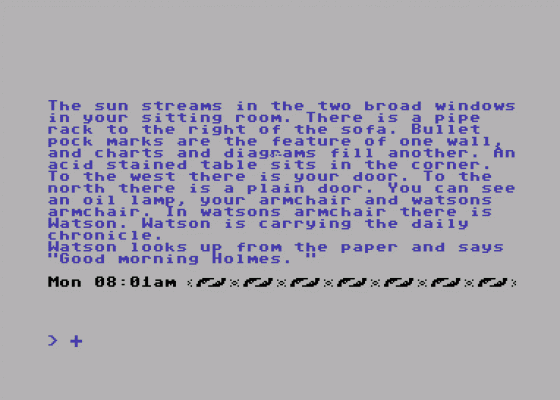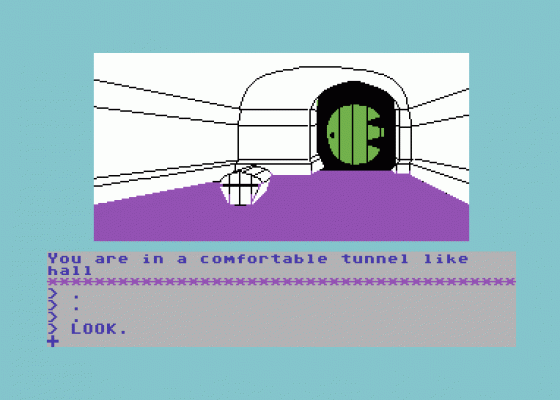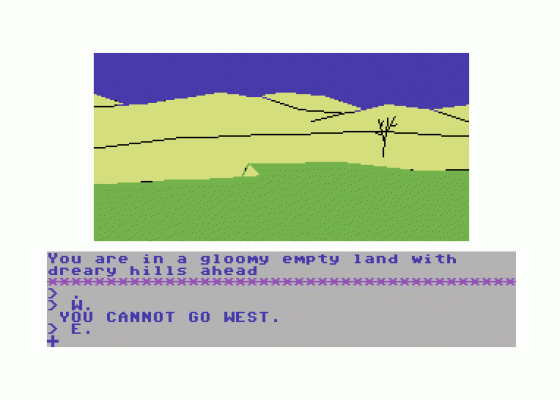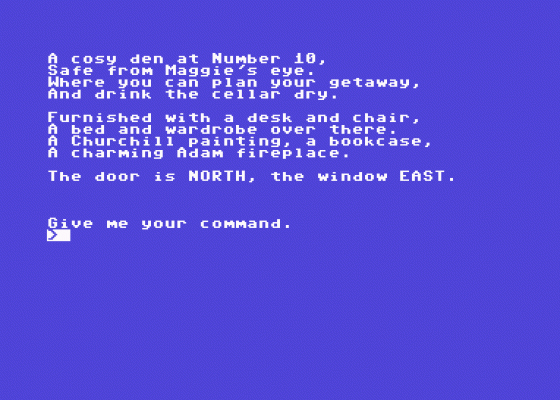Into The Valley
Now that we've all broken into our piggy banks to buy our nearest and dearest even more spectacular Christmas presents than last year, ardent Adventurers will be keen to revive those flagging savings. What better than to solve an adventure and win a fortune into the bargain? You could win £25,000 by solving Eureka! or win a diamond by cracking the secret of Commodore's new Spirit Of The Stones...
I have a suspicion that there are software snobs in just the same way as there are those cinema freaks who talk about film - and then, only if it can be viewed in a 20-seat art theatre and portrays black-and-white documentaries of the peasant struggle in nineteenth century Albania (with Danish subtitles).
They are probably more numerous among adventure gamers too. They're up until three in the morning waiting for just one turn at Mud and strongly hold the view that Philip Mitchell should be canonised (if such a thing is possible in the case of an Australian - let alone advisable).
They keep meticulous notes and maps, of all the adventures they play. To use HELP even once is to risk immediate excommunication from this elfin elite.
And when it comes to buying new software, they're even more critical and cynical that the sub-teens I see scanning the racks in WH Smith on a Saturday morning. They are especially wary of the hyped title - much preferring the single-figure camaraderie of a game that only seven other people will ever buy But are they always right to be po-featured in the face of pizzaz?
Eureka! is a case in point. Wasn't there a danger that the clever teaser ads followed by enticing full-colour pages of clout, and the promise of a £25,000 prize would be seen as a little too slick, a mite too glossy, for the game itself to be taken seriously? After all, there are always the headstones of Imagine and Rabbit to remind us of what happens when software advertising is consistently better than the products it promotes.
But in the case of Eureka! at least, any such suspicions must be quickly dispelled. Its pedigree helps. The 250K text and graphics skirmish with prehistoric Europe, Roman Italy, Celtic Britain, war-time Germany and the modern-day Caribbean is the work of Ian Livingstone and the talented Hungarians in Andromeda's stable who brought such a refreshing look to games like Caesar The Cat.
Given that the prize element is obviously important, reviewers were provided, at most, with only two of the five sections which comprise the game - and I wouldn't be at all surprised if even these didn't vary in some subtle respects from the public versions. Also, unavailable at the time was the colourful booklet containing additional riddles and illustrations and which offers more clues to discovering the phone number that you must be the first to ring to claim that £25,000.
Even so, the sample more than testifies to the quality and excellent of Eureka! Putting to one side the prospect of a glittering prize - because the game must surely be judged on its intrinsic merits - Eureka! is well-furnished with challenges which are sometimes encouragingly easy - at other times, very testing.
But responses are fast and logical, and so even if your progress is brought to an abrupt halt in the path of a runaway horse or in the hull of a sinking slave ship, you should be able to figure out where you went wrong and be back on the track (or lava path, or Appian Way, or wherever) fairly soon.
The graphics are a stroke of near-genius. Instead of using hi-res screens with text windows (with all the attendant limitatons), the Andromeda team have used multicoloured and multi-layered sprites to create smaller but brilliantly coloured and highly-detailed pictures which can thus be stored, displayed and changed almost instantly.
Many incorporate animated elements to add extra interest. The overall enjoyment is heightened by full use of the C64's sound potential. The marvellously strident music in the Roman segment, for example, reminded me of those 1950s epics in which Victor Mature used to fight a lion with one hand and a gladiator with the other while saving most of his energy for Gina Lollobrigida. So Eureka! is that rare thing - a hugely-hyped game that actually does live up to the promises of its advertising.
A Spy From Beyond
Those of us old enough to have been young enough (if you know what I mean) to be anarchic, even before the era of Monty Python, will greet with nostalgic delight the news that Antonia Prohias's duelling, wedge-nosed secret agents from the pages of Mad are to feature in Spy Vs. Spy from Beyond Software.
I had my wrists slapped by Beyond's Clive Bailey for daring to suggest that it might be categorised as an arcade adventure; it is an 'animated cartoon strategy game'... I think he said. And as with that other well-known game of strategy, two can play, it should keep the joystick manufacturers happy anyway.
What do you do for an encore with one mega hit under your belt? You don't necessarily hit another vein of gold the second time around - as Melbourne House discovered after The Hobbit. Successors to that title have been adequate but hardly outstanding. Then again, you don't hack out that quality of program over a long weekend, and indeed it is almost wondrous that Philip Mitchell has polished off Sherlock as quickly as he has.
Sherlock Homes In

Sherlock is almost a pure text adventure, though there are some graphics along the way. The real appeal of the game is the intelligence of the parser routines, which build on the facility for third-person communication and interaction first seen in The Hobbit to an extent that will impress even Zorkists. Incidentally, it used to be only Infocom who were any good at producing supporting documentation; indeed, but the 18-page booklet that comes with Sherlock improves even on that standard.
By the way, don't make the mistake (as a friend did) of putting to one side the timetables and other scraps which come with the game, thinking them to be only amusing make-weights. If you're on the right lines (hint! hint!) you should find a use for them all.
Players of the Aztec Tomb from Alligata can testify to the fact that this early effort by Tony Crowther gave little hint of his latent talents, which were to eventually surface in Loco and Suicide Express. Pretty brave of Alligata then, to use the title Aztec Tomb Revisited (£7.95, £11.95 disk) for their latest adventure. Even more courageous perhaps of Mr. Micro to promise a new graphics adventure every fortnight on Compunet, coming soon. The games will be linked, and users will be able to download them onto disk from the Software Park pages. Meanwhile, Commodore are also said to like the idea of adding a multi-player, interactive game as a Compunet rival to Mud - originally run on Essex University's DEC 10 computer and recently acquired by Century Communications for relaunch later this year.
Two adventuers of very different calibre are included in Select One - the complication cassette of twelve games for the C64 selling at £1249. Sadly, Ring Of Power, originally published by Quicksilva at £9.95, has about as much appeal as a day-old pot noodle. It is supposed to be a graphic adventure, but all you see are crude sprite representations of various objects or, if you type PICTURE (though the original inlay never told you this!), you can call up a view of three walls marked with N, S, E or W to indicate legitimate exits. I legitimately exited after only a few minutes of disbelief.
Denis The Micro-Menance
Denis Through The Drinking Glass is something else again; a Quill-generated text adventure in which the PM's hubby must thwart everyone and everything in the way of satisfying his legendary (?) propensity for a quick snorter. It is inoffensively entertaining and almost compensates for the inadequacies of its bedfellow in this collection. Or you can buy it separately from Applications Software at £5.50.
The brace of new graphic adventures from Audiogenic at £5.95 are - if you'll pardon the extended metaphor - a bit of a curate's egg. In Time Traveller, you're off to wrest the magic hourglass from the evil Graf von unpronounceable with the assistance of 1990s technology (which is like 1980s technology - only the guarantee has run out!). In The Magic Stone, the scenario has you searching for the all-night alchemist and the means of turning lead into gold; machine coders attempting to convert Spectrum games for the C64 will be familiar with the challenge.
Both adventures accept the usual verb/noun pairs plus single-letter inputs for frequently used commands. The graphics are not at all bad, there are some nice puzzles, and the HELP option is, if anything, a little too obliging. Still, the fact that I didn't speed along suggests that the full game will in each case provide even fairly experienced adventurers with a few hours of contemplation.
A few more than they might expect in fact. This is because, apparently, neither Time Traveller nor The Magic Stone has a SAVE facility. Together with the fact that both titles take around ten minutes to load, this means that you'll have plenty of time to console yourself with the thought that there are Koala Pad outfits for the first three players of each adventure to declare the most expeditious solution. Some irony there.
Spirit Of Commodore
Prizes of even more sparkle are your incentive in Spirit Of The Stones, a kind of Masquerade for the computer literate which marks Commodore's first substantial original title in the genre. For your £14.95, you get a large-format book packed with full-colour illustrations, in which author John Worsley tells the tale of a fortune in diamonds hidden on the Isle of Wight. By reading the book and studying the illustrations, and by exploring the 21 locations-cum-games which feature in the accompanying software, you should be on your way to discovering and claiming one or more of the 40 diamond talismen offered as prizes - and possibly the even more valuable Great Wight Eye.
Better still, Commodore have established a royalty find which will grow by 50p with every copy of the game purchased. So successful claimants not only get to keep the diamonds but will have at least one share out of the 50 available in the fund's total when it closes. That will be when all 41 talismen have been claimed, when the fun has reached £1 million, or in December 1993 - whichever happens first.
All clever stuff - and very far, too; especially since you can claim by post and don't actually have to dig up the treasures. But for a concept that asprites to Williamesque sophistication - and certainly has an up-market price tag - Spirit falls a little flat when it comes to the games element. Co-author Ian Gray seems more at home with graphic adventures, such as his googly Heroes Of Karn, than with the tedious and samey arcaders he's devised here. They're a little too difficult for the younger player and probably rather too trite for the concentional adventurer to bother mastering.
Yet I've played (worse still, bought!) poorer efforts, and its two-score chance of winning a rock plus a share of perhaps £1 million might just give Spirit a place in the charts that it wouldn't otherwise deserve.
And finally, since characters from the past have figured pretty strongly in this month's column, can you deduce what (or who) Sherlock Holmes and the Goons had in common? First correct answer out of the hat - on a postcard please, by Friday 1st February - wins a mint fastload cassette of Storm Warrior - Front Runner's feature-packed 12-screen arcade adventure and a classic of its type.


 1st December 1984
1st December 1984











